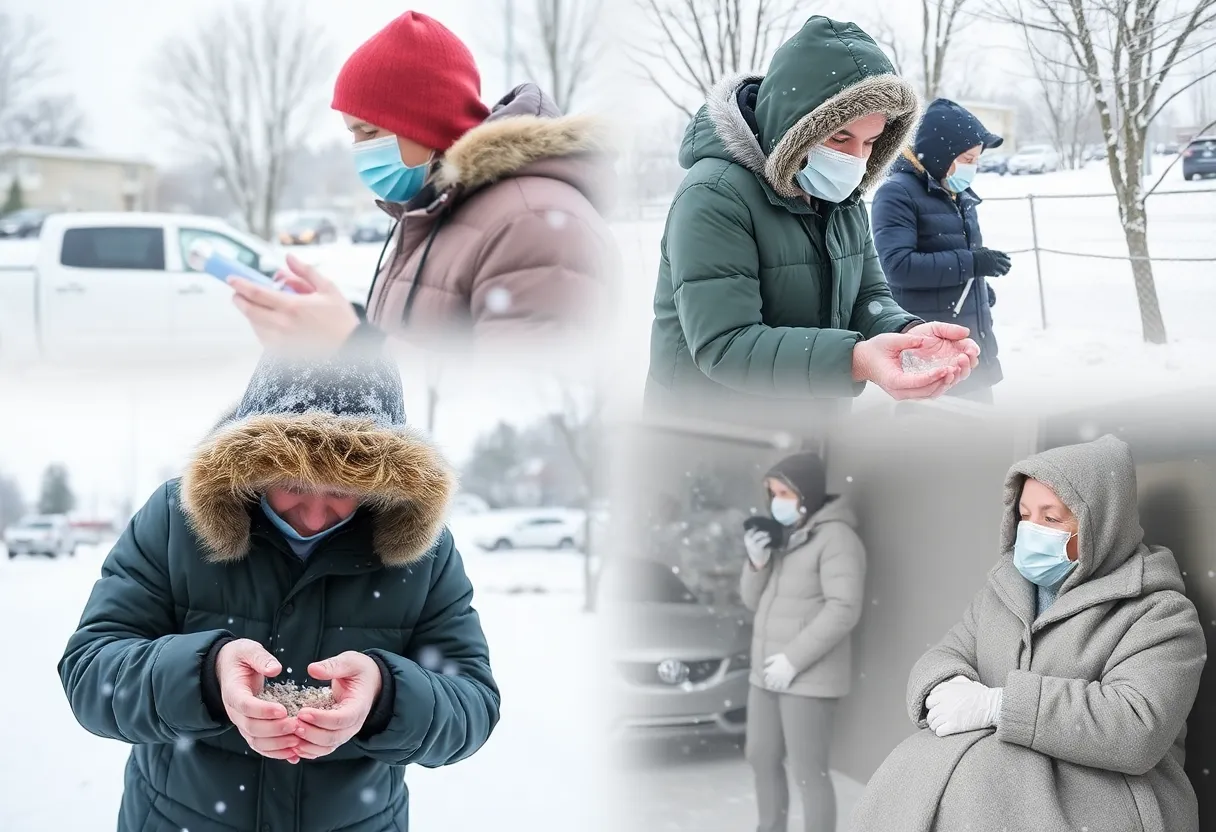News Summary
This winter, Kentucky is seeing a significant rise in respiratory illnesses and norovirus cases. The CDC reports a surge in ailments including COVID-19, influenza, and RSV, especially concerning for children and vulnerable populations. Emergency visits have surged during this peak season, raising alarms over public health. With the increase in norovirus infections, proper hygiene and awareness become paramount to mitigate the spread of these illnesses. Residents are urged to wash hands and sanitize to stay safe amidst these challenges.
Kentucky Faces a Winter Health Crisis
This winter, Kentucky is experiencing a concerning uptick in respiratory illnesses and highly contagious stomach bugs. The state is prominently marked in red on the CDC’s respiratory virus tracker, indicating a significant surge in ailments like COVID-19, influenza, and respiratory syncytial virus (RSV). But that’s not all—there’s also the notorious norovirus making waves across the state.
The Norovirus Threat
Norovirus has gained media attention as a highly contagious stomach bug this season, and it’s making many Kentuckians quite ill. This virus spreads easily, particularly on contaminated surfaces, and unfortunately, it’s resistant to typical alcohol-based hand sanitizers. With no specific treatment available for norovirus, management typically includes rest and staying hydrated with electrolyte-rich fluids.
The symptoms of norovirus can last anywhere from one to three days, with the potential for severe cases leading to dehydration. This virus is remarkably contagious; individuals can shed billions of viral particles without any visible symptoms, making it easy for it to spread swiftly between people.
Know the Symptoms
Norovirus symptoms often hit hard and include diarrhea, vomiting, nausea, stomach pain, fever, headache, and body aches. It’s worth noting that those infected can remain contagious for up to two weeks even after they feel better. For parents and caregivers, this is particularly alarming as Kentucky Children’s Hospital has been witnessing an increase in flu and RSV admissions, with pediatricians reporting 10 to 20 young patients requiring hospitalization daily.
Emergency Visits Surge
During late December, emergency department visits for acute respiratory illness peaked at a staggering 10,413 visits, representing a whopping 26% of all visits. However, by January 11, that number saw a decrease to 5,716 visits, accounting for 19% of all emergency visits. This fluctuation indicates that while the situation may be improving, the risk remains high.
Keeping Safe and Clean
As norovirus can wreak havoc in closed environments such as nursing homes, schools, and even cruise ships, proper hand hygiene is crucial. The CDC suggests washing hands thoroughly for at least 20 seconds with soap to help combat this illness. Additionally, disinfecting surfaces with chlorine bleach or other potent disinfectants is vital, especially in the wake of any incidents involving vomit or diarrhea.
For personal laundry from anyone infected, it’s recommended to wash items using detergent on a hot cycle. If you’re handling these items, it’s best to do so with rubber gloves to prevent further spread of the virus.
The Bigger Picture
The surge in norovirus cases can largely be traced back to a return to normal activities following the COVID-19 lockdowns. From August to December 2023, the U.S. reported 495 cases of norovirus, a noticeable increase from 363 cases in the same period the year prior. In fact, norovirus is one of the leading causes of foodborne illness in the country, accounting for about 58% of yearly infections and leading to approximately 900 deaths and 109,000 hospitalizations annually.
Importantly, young children, older adults, and those with weakened immune systems are at the highest risk as they can experience severe dehydration. Therefore, staying vigilant this winter is key to keeping Kentucky healthy.
In summary, while Kentucky faces health challenges this season due to respiratory illnesses and norovirus, awareness, caution, and cleanliness can help us navigate these hurdles effectively. Let’s keep our hands washed and surfaces clean to fend off the lingering threats of winter illnesses!
Deeper Dive: News & Info About This Topic
HERE Resources
ABPN Online Certification Lockout Sends Shockwaves Among Physicians
Lexington and Louisville Unite to Combat Homelessness
Kentucky’s Political Landscape: Key Issues and Community Action
Lexington Faces Alarming Rise in Pedestrian Fatalities: Community Pushes for Enhanced Road Safety Measures
Kentucky Mother Seeks Answers After Son’s Death Following Hospital Escape
Legislators Unite in Frankfort to Tackle Kentucky’s Healthcare Workforce Crisis
Kentucky’s Healthcare Accessibility Improves Amid Ongoing Challenges, Fueled by Medicaid Expansion and Telehealth Investments
Emma’s Dream Comes True as Lexington Dream Factory Surprises Her with Taylor Swift Concert Tickets
Lexington Launches Crisis Response Team to Improve Mental Health Emergency Services
Appalachian Regional Healthcare Foundation Mobilizes to Assist Hurricane Helene Victims
Additional Resources
- Kentucky Lantern: Norovirus is on the rise – How to protect yourself
- Google Search: Norovirus
- WKYT: Nasty Norovirus is back full force
- Wikipedia: Norovirus
- Daily Independent: Viruses Hot and Heavy in Kentucky
- Encyclopedia Britannica: Norovirus
- LEX18: Flu and Norovirus Cases Continue to Rise
- Google News: Respiratory illnesses Kentucky

Author: STAFF HERE LEXINGTON KY STAFF
The LEXINGTON STAFF WRITER represents the experienced team at HERELexingtonKY.com, your go-to source for actionable local news and information in Lexington, Fayette County, and beyond. Specializing in "news you can use," we cover essential topics like product reviews for personal and business needs, local business directories, politics, real estate trends, neighborhood insights, and state news affecting the area—with deep expertise drawn from years of dedicated reporting and strong community input, including local press releases and business updates. We deliver top reporting on high-value events such as Woodland Art Fair, Crave Food and Music Festival, and Railbird Festival. Our coverage extends to key organizations like Commerce Lexington and Blue Grass Community Foundation, plus leading businesses in education, manufacturing, and technology that power the local economy such as University of Kentucky, Toyota Motor Manufacturing, and Lexmark. As part of the broader HERE network, including HEREBowlingGreen.com and HERELouisville.com, we provide comprehensive, credible insights into Kentucky's dynamic landscape.





